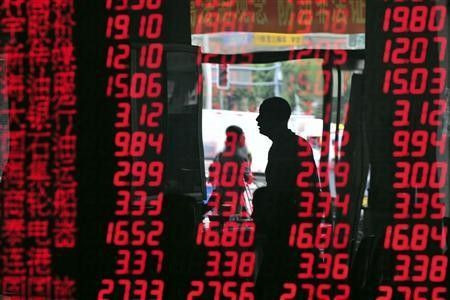Stocks Bounce on U.S. Cues; Sentiment Wary

Asian equities bounced on Monday and safe-haven assets like gold and the Swiss franc fell as market players cautiously returned to pick up bargains after last's week wild ride, though concerns over the weak global economic outlook may keep gains in check.
A modest 0.4 percent rise in U.S. stock futures also encouraged some bargain hunting in Asian markets, but investors may be more likely to sell into rallies than buy into any dips ahead of fresh readings on the U.S. and euro zone economies this week.
Japan's Nikkei .N225 rose 1.5 percent after main Wall Street .N indices advanced on Friday but without the wild intra-day swings that marked the first few days of trading last week after the U.S. credit rating was downgraded by Standard and Poor's.
Japanese shares were also boosted by data showing Japan's economy shrank less than expected in April-June following a devastating earthquake and tsunami in March. .T
Asian stocks outside of Japan rose by a similar margin .MIAPJ0000PUS, after tumbling nearly 4 percent last week, with key indexes in Hong Kong and Australia up nearly 2 percent.
Frances Cheung, senior strategist at Credit Agricole in Hong Kong, said a meeting between the leaders of France and Germany on Tuesday would be crucial to determining whether any longer term solution to the euro zone's sovereign debt crisis is in the works.
"There is still a huge focus on money markets ... and looking at them shows not everything is solved," she said.
German Chancellor Angela Merkel and French President Nicolas Sarkozy are due to meet in Paris to hammer out a solution to the sovereign debt crisis which has shown signs of ensnaring the big euro zone economies like Italy and Spain and heightened strains in money markets to levels not seen during the 2008 crisis.
In recent days, France itself has come under attack from the markets.
While dollar funding costs evident from cross currency basis swap rates in dollar/yen and dollar/euros have cooled from last week's peaks, they are still at elevated levels.
On a valuation basis, the MSCI index of Asia stocks outside Japan trades at 11.5 times forward 12-month earnings, according to Thomson Reuters I/B/E/S, above the 7.9 times seen during the depths of the 2008 financial crisis.
That suggests investors may still not be in a hurry to buy despite the 13 percent decline over the last two weeks.
Markets also remain vulnerable to declines as debt cutting plans in Europe and the United States threaten to act as a further drag on already weak economic growth at a time when latest data has been patchy.
U.S. consumer sentiment plunged to its lowest level since 1980 in early August, data showed on Friday, though July retail sales rose 0.5 percent.
FRANC TUMBLES
Still, signs that equities might have marked a temporary bottom after last week's volatile moves and persistent chatter that Swiss authorities may peg the franc against the euro to battle its surge sent the safe-haven currency tumbling by two percent against the euro and the dollar.
The euro, which plumbed a record low around 1.0075 francs last week, climbed to a high of 1.1294 francs in morning trade, up from 1.1079 late in New York on Friday.
But Barclays Capital analysts warned expectations of a peg seemed overdone, believing the franc would rally once again this week if markets started to change their view on its probability.
"We remain CHF bears in the medium run - we agree with the SNB's view that it is "massively overvalued" - but, this week, we are not expecting the recent appreciation of EUR/CHF to hold," said Paul Robinson, strategist at Barclays Capital.
The drop in the franc rippled over into gold markets with the precious metal slipping after a 1.5 percent slide in the previous session. Before Friday's slide, gold had gained 9 percent so far this month.
U.S. crude futures were steady around $85.50 a barrel after settling down slightly on Friday.
Trading activity is expected to be thin with Korea and India out and Japan's summer "obon" holidays this week.
Gold fell more than 1 percent in early trade before paring most of its losses. By late morning it was at $1,744 an ounce, little changed from late Friday U.S. levels.
© Copyright Thomson Reuters 2024. All rights reserved.



















